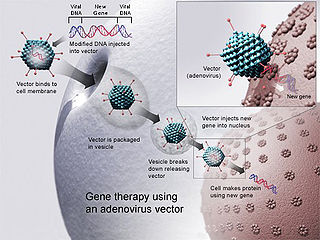 W
WHuman genetic enhancement or human genetic engineering refers to human enhancement by means of a genetic modification. This could be done in order to cure diseases, prevent the possibility of getting a particular disease, to improve athlete performance in sporting events, or to change physical appearance, metabolism, and even improve physical capabilities and mental faculties such as memory and intelligence. These genetic enhancements may or may not be done in such a way that the change is heritable (which has raised concerns within the scientific community.
 W
WTranshumanism is a philosophical movement that advocates for the transformation of the human condition by developing and making widely available sophisticated technologies able to greatly modify or enhance human intellect and physiology.
 W
WThe following outline provides an overview of and a topical guide to transhumanism, an international intellectual and cultural movement that affirms the possibility and desirability of fundamentally transforming the human condition by developing and making widely available technologies to eliminate aging and to greatly enhance human intellectual, physical and psychological capacities. Transhumanist thinkers study the potential benefits and dangers of emerging and hypothetical technologies that could overcome fundamental human limitations as well as study the ethical matters involved in developing and using such technologies. They predict that human beings may eventually be able to transform themselves into beings with such greatly expanded abilities as to merit the label posthuman.
 W
WAgni Yoga or the Living Ethics, or the Teaching of Life, is a Neo-Theosophical religious doctrine transmitted by Helena Roerich and Nicholas Roerich from 1920. The term Agni Yoga means "Mergence with Divine Fire" or "Path to Mergence with Divine Fire". This term was introduced by the Roerichs. The followers of Agni Yoga believe that the teaching was given to the Roerich family and their associates by Master Morya, the guru of the Roerichs and of Helena Blavatsky, one of the founders of the modern Theosophical movement and of the Theosophical Society.
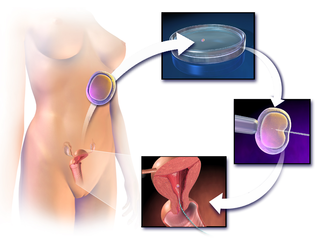 W
WAssisted reproductive technology (ART) includes medical procedures used primarily to address infertility. This subject involves procedures such as in vitro fertilization, intracytoplasmic sperm injection (ICSI), cryopreservation of gametes or embryos, and/or the use of fertility medication. When used to address infertility, ART may also be referred to as fertility treatment. ART mainly belongs to the field of reproductive endocrinology and infertility. Some forms of ART may be used with regard to fertile couples for genetic purpose. ART may also be used in surrogacy arrangements, although not all surrogacy arrangements involve ART.
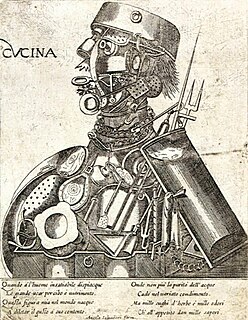 W
WA cyborg, a portmanteau of "cybernetic organism", is a being with both organic and biomechatronic body parts. The term was coined in 1960 by Manfred Clynes and Nathan S. Kline.
 W
WCyborg art, also known as cyborgism, is an art movement that began in the mid-2000s in Britain. It is based on the creation and addition of new senses to the body via cybernetic implants and the creation of art works through new senses. Cyborg artworks are created by cyborg artists; artists whose senses have been voluntarily enhanced through cybernetic implants. Among the early artists shaping the cyborg art movement are Neil Harbisson, whose antenna implant allows him to perceive ultraviolet and infrared colours, and Moon Ribas whose implants in her feet allow her to feel earthquakes and moonquakes. Other cyborg artists include:Manel De Aguas, a Catalan photographer who developed fins that allow him to perceive atmospheric pressure, humidity and temperature through a couple of implants at each side of his head. Joe Dekni, an artist who has developed and installed a radar system in his head. The sensory system includes two implants in his cheekbones. Pau Prats, creator of a system that allows him to feel the ultraviolet ray levels that reach his skin. Alex Garcia, whose sensor installed in his chest allows him to feel the air quality levels around him. Kai Landre, a musician developing two implants to hear the sound of the particles affected by the collusion of cosmic rays.
 W
WTranshumanist politics constitutes a group of political ideologies that generally express the belief in improving human individuals through science and technology.
 W
WA designer baby is a baby whose genetic makeup has been selected or altered, often to include a particular gene or to remove genes associated with a disease. This process usually involves analysing a wide range of human embryos to identify genes associated with particular diseases and characteristics, and selecting embryos that have the desired genetic makeup; a process known as preimplantation genetic diagnosis. Other potential methods by which a baby's genetic information can be altered involve directly editing the genome before birth. This process is not routinely performed and only one instance of this is known to have occurred as of 2019, where Chinese twins Lulu and Nana were edited as embryos, causing widespread criticism.
 W
WThe eradication or abolition of suffering is the concept of using biotechnology to create a permanent absence of pain and suffering in all sentient beings.
 W
WExtropianism, also referred to as the philosophy of Extropy, is an "evolving framework of values and standards for continuously improving the human condition". Extropians believe that advances in science and technology will some day let people live indefinitely. An extropian may wish to contribute to this goal, e.g. by doing research and development or by volunteering to test new technology.
 W
WIn futurology, especially in Europe, the term foresight has become widely used to describe activities such as:critical thinking concerning long-term developments, debate and for some futurists who are normative and focus on action driven by their values who may be concerned with effort to create wider participatory democracy. Foresight is a set of competencies and not a value system, however. shaping the future, especially by influencing public policy.
 W
WThe Future of Work and Death is a 2016 documentary by Sean Blacknell and Wayne Walsh about the growth of exponential technology.
 W
WGrindhouse Wetware is an open source biotechnology startup company based in Pittsburgh, Pennsylvania. Grindhouse applies the biohacker ethic to create technology that augments human capabilities. The company is most well known for their Circadia device, a wireless biometric sensor that was implanted into co-founder Tim Cannon on the 22 October 2013. Grindhouse has been featured in television shows such as Taboo on National Geographic Channel, Joe Rogan Questions Everything on Syfy, The Big Picture with Kal Penn, as well as podcasts including Future Grind and Roderick Russell's Remarkably Human.
 W
WThe terms human–animal hybrid and animal–human hybrid refer to an entity that incorporates elements from both humans and animals.
 W
WIntelligence amplification (IA) refers to the effective use of information technology in augmenting human intelligence. The idea was first proposed in the 1950s and 1960s by cybernetics and early computer pioneers.
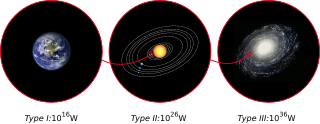 W
WThe Kardashev scale is a method of measuring a civilization's level of technological advancement based on the amount of energy they are able to use. The measure was proposed by Soviet astronomer Nikolai Kardashev in 1964. The scale has three designated categories:A Type I civilization, also called a planetary civilization—can use and store all of the energy available on its planet. A Type II civilization, also called a stellar civilization—can use and control energy at the scale of its planetary system. A Type III civilization, also called a galactic civilization—can control energy at the scale of its entire host galaxy.
 W
WTranshumanist politics constitutes a group of political ideologies that generally express the belief in improving human individuals through science and technology.
 W
WIn the life extension movement, longevity escape velocity (LEV) or actuarial escape velocity is a hypothetical situation in which life expectancy is extended longer than the time that is passing. For example, in a given year in which longevity escape velocity would be maintained, technological advances would increase life expectancy more than the year that just went by.
 W
WMagnetic implantation is an experimental procedure in which small, powerful magnets (neodymium) are inserted beneath the skin, often in the tips of fingers. They exist in tubes and discs. This procedure is popular among biohackers and grinders, but remains experimental. Magnetic implants are often performed by amateurs at home, using readily available surgical tools and magnets found online. However, some professional body modification shops do perform implant surgeries. Magnetic implants can also be used as an interface for portable devices to create other new "senses", for example converting other sensory inputs such as ultrasonic or infra-red into a touch sensation. In this way the individual could 'feel' e.g. the distance to objects.
 W
WA human microchip implant is typically an identifying integrated circuit device or RFID transponder encased in silicate glass and implanted in the body of a human being. This type of subdermal implant usually contains a unique ID number that can be linked to information contained in an external database, such as personal identification, law enforcement, medical history, medications, allergies, and contact information.
 W
WMind uploading, also known as whole brain emulation (WBE), is the hypothetical futuristic process of scanning a physical structure of the brain accurately enough to create an emulation of the mental state and copying it to a computer in a digital form. The computer would then run a simulation of the brain's information processing, such that it would respond in essentially the same way as the original brain and experience having a sentient conscious mind.
 W
WNeuralink Corporation is an American neurotechnology company founded by Elon Musk and others, developing implantable brain–machine interfaces (BMIs). The company's headquarters are in San Francisco; it was started in 2016 and was first publicly reported in March 2017.
 W
WPostgenderism is a social, political and cultural movement which arose from the eroding of the cultural, psychological, and social role of gender, and an argument for why the erosion of binary gender will be liberatory.
 W
WNanopunk refers to an emerging subgenre of science fiction that is still very much in its infancy in comparison to its ancestor-genre, cyberpunk, and some of its other derivatives.
 W
WThe quantified self refers both to the cultural phenomenon of self-tracking with technology and to a community of users and makers of self-tracking tools who share an interest in “self-knowledge through numbers.” Quantified Self practices overlap with the practice of lifelogging and other trends that incorporate technology and data acquisition into daily life, often with the goal of improving physical, mental, and/or emotional performance. The widespread adoption in recent years of wearable fitness and sleep trackers such as the Fitbit or the Apple Watch, combined with the increased presence of Internet of Things in healthcare and in exercise equipment, have made self-tracking accessible to a large segment of the population.
 W
WRoerichism or Rerikhism is a spiritual, cultural and social movement that emerged in the United States in the first half of the twentieth century, though it has been described as a "thoroughly Russian new religious movement", due to its close connection with Russia.
 W
WRussian cosmism is a philosophical and cultural movement that emerged in Russia in the turn of the 19th and 20th centuries.
 W
WSingularitarianism is a movement defined by the belief that a technological singularity—the creation of superintelligence—will likely happen in the medium future, and that deliberate action ought to be taken to ensure that the singularity benefits humans.
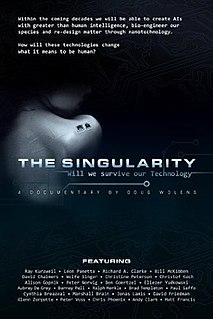 W
WThe Singularity is a 2012 documentary film about the technological singularity, produced and directed by Doug Wolens. The film has been called "a large-scale achievement in its documentation of futurist and counter-futurist ideas”.
 W
WTechno-progressivism or tech-progressivism is a stance of active support for the convergence of technological change and social change. Techno-progressives argue that technological developments can be profoundly empowering and emancipatory when they are regulated by legitimate democratic and accountable authorities to ensure that their costs, risks and benefits are all fairly shared by the actual stakeholders to those developments.
 W
WTechnoCalyps is a 2006 Belgian transhumanism documentary film written and directed by Frank Theys. It explores the advance of technology.
 W
WTechnogaianism is a bright green environmentalist stance of active support for the research, development and use of emerging and future technologies to help restore Earth's environment. Technogaians argue that developing safe, clean, alternative technology should be an important goal of environmentalists.
 W
WTranscendent Man is a 2009 documentary film by American filmmaker Barry Ptolemy about inventor, futurist and author Ray Kurzweil and his predictions about the future of technology in his 2005 book, The Singularity is Near. In the film, Ptolemy follows Kurzweil around his world as he discusses his thoughts on the technological singularity, a proposed advancement that will occur sometime in the 21st century when progress in artificial intelligence, genetics, nanotechnology, and robotics will result in the creation of a human-machine civilization.
 W
WTranshuman, or trans-human, is the concept of an intermediary form between human and posthuman. In other words, a transhuman is a being that resembles a human in most respects but who has powers and abilities beyond those of standard humans. These abilities might include improved intelligence, awareness, strength, or durability. Transhumans sometimes appear in science-fiction as cyborgs or genetically-enhanced humans.
 W
WTranshuman Space (THS) is a role-playing game published by Steve Jackson Games as part of the "Powered by GURPS" line. Set in the year 2100, humanity has begun to colonize the Solar System. The pursuit of transhumanism is now in full swing, as more and more people reach fully posthuman states.
 W
WTranshumanist politics constitutes a group of political ideologies that generally express the belief in improving human individuals through science and technology.